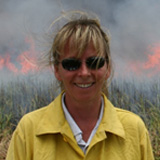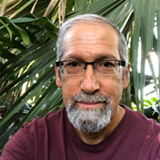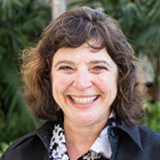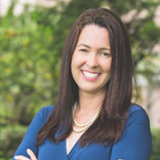DIG Plenary Session

Design, Innovation, and Governance (DIG): Solutions for Everglades Restoration
Tuesday, April 23, 2019
8:30am – 10:00am
Organizer:
Fred Sklar, Director and Section Administrator, Everglades Systems Assessment Section, South Florida Water Management District, West Palm Beach, FL
Session Description
Once again, GEER will feature a session on Design, Innovation and Governance – or a DIG SESSION – with speakers giving thoughtful and provocative presentations on Everglades science and restoration topics. Sessions that DIG deeper will continue to be a mainstay of future GEER conferences, offering a unique blend of the art of communication with a passion for science.
Presenter Coaching provided by Jezra Kaye, "Speak Up for Success" (Jezra@JezraKaye.com), Speaker Coach / President
DIG Presentations (In order of appearance)

“Resuscitate Resilience by Curbing Cattail”
Dr. Sue Newman
Section Leader, Marsh Ecology Research Group
Everglades Systems Assessment (ESA) Section
South Florida Water Management District
West Palm, Florida
Dr. Newman has been conducting research in the Everglades for 28 years. The current foci of her research group are large-scale multi-disciplinary projects designed to support Everglades restoration by rehabilitating ecological function in nutrient enriched areas and examining key uncertainties associated with restoring flow to the ecosystem. The synthesis of these programs may be used to understand and evaluate potential tradeoffs associated with restoration activities.
Outside of her research in the natural system, Sue is the co-lead of multi-disciplinary studies designed to optimize phosphorus removal in the stormwater treatment areas. Sue obtained her Ph.D. degree in soil and water science from the University of Florida. Her specialties include aquatic biogeochemistry, wetland ecology, and more recently food web interactions. Sue is a member of the Graduate Faculty of the University of Florida and Florida Atlantic University.

“Salt, Fire, Water and the Fate of an Ecosystem ”
Dr. Dave Rudnick
Science Coordination Branch Chief
South Florida Natural Resources Center
Everglades National Park
Homestead, FL
Dr. Rudnick is an estuarine and wetland ecologist who has served as the Everglades Science Coordinator for National Park Service (NPS) and program manager of the NPS’ Critical Ecosystem Studies Initiative for the past seven years. He is responsible for the planning, oversight, and synthesis of monitoring, research, and modeling that provides critical scientific information for Everglades restoration and management of Everglades National Park.
From 1993 – 2011, Rudnick led the Florida Bay research team at the South Florida Water Management District, conducting research to understand the linkage of Florida Bay ecosystem dynamics to the Everglades watershed and its management. His research has focused on estuarine biogeochemistry, especially regarding decomposition processes and nutrient cycling and the effects of salinity variations. David holds a Ph.D. in oceanography from the University of Rhode Island and held postdoctoral research positions at the Marine Biological Laboratory in Woods Hole and Cornell University.

“The Wizard of the Wind”
Dr. Evelyn Gaiser
Endowed George Barley Eminent Scholars Chair, Professor
Florida International University
Miami, Florida
Dr. Gaiser is an aquatic ecologist whose research is focused on understanding how algae can be used as “sentinels” of the effects of long-term changes in climate and land-use in aquatic ecosystems. While her work focuses on aquatic systems of South Florida, she and her students also conduct international studies to expand findings contextually. Dr. Gaiser also contributes to creative work that unites faculty across the natural and social sciences and humanities and forges community partnerships to foster sustainability of the planet. She is also a trained musician and has created creative works to express science through music (https://www.youtube.com/watch?v=m7fCmHG3h7k).
Research in Dr. Gaiser’s lab has informed the progress of Everglades Restoration, and is integrated into the Florida Coastal Everglades Long-Term Ecological Research program (FCE LTER, http://fcelter.fiu.edu/), which Dr. Gaiser has led since 2007. The FCE LTER program is a National Science Foundation (NSF)-funded long-term Everglades research platform operated out of FIU, and is one of 28 sites in the U.S. LTER Network. The FCE LTER program includes 75 senior scientists and 64 students from multiple departments and schools at FIU, as well as 29 partnering institutions including academic and agency partners.

"Restoring Beauty Requires a Beast or Two"
Dr. Mark Cook
Section Leader
Everglades Systems Assessment Section
South Florida Water Management District
West Palm Beach, FL
Born and bred in the United Kingdom, Dr. Mark Cook has a Masters in ecology and a PhD in avian behavioral ecology. He is currently a Section Leader of a multidisciplinary science group in the Everglades Systems Assessment Section of the South Florida Water Management District in West Palm Beach. For the past 15 years, Dr. Cook’s research has focused on the restoration and management of wetland fauna in the Everglades. It involves understanding the relationships among avian reproduction, aquatic prey availability and wetland hydrologic conditions, as well as the potential impacts of non-native plant and animal species. Current research is exploring the role of wildlife in wetland nutrient cycling.
Dr. Cook has published over 50 manuscripts and reports on birds, waterfowl, fishes, crayfish and exotic animal species. He is the editor of the widely reported annual South Florida Wading Bird Report.
Mark received his PhD from Glasgow University, Scotland, where he specialized on life-history and breeding strategies of arctic seabirds. Prior to working at the District he spent four years as a post-doctoral researcher at the University of California, Berkeley studying nesting strategies of Neotropical passerines in the rainforests of Puerto Rico.

“The Spirit of the Everglades: A Native American View”
Ms. Krystle Young
Student
University of Miami
Coral Gables, Florida
Krystle Young is a master’s student at the University of Miami studying biology. She is a member of the Seminole Tribe of Florida, an indigenous tribe in South Florida. Krystle received her B.A. in English at the University of Miami.
For her thesis project, Krystle is studying four sites in southern Biscayne Bay comparing the biological diversity of Vizcaya, Black Point, Convoy Point, and Card Sound and created a curriculum to teach middle school students the importance of biological diversity and Biscayne Bay.
Krystle is a part of Dr. Kathleen Sealey’s lab at the University of Miami who’s focus is on coastal ecology. As part of her experience in the lab, she also works on a Monroe County project monitoring the canals for water quality.

“Resisting Arrest”
Ms. Shannon A. Estenoz
Chief Operating Officer and Vice President of Policy
The Everglades Foundation
Palmetto Bay, Florida
Shannon is currently the Chief Operating Officer and Vice President of Policy of The Everglades Foundation. Shannon’s Everglades career spans twenty-two years during which she served as the Executive Director of the Environmental and Land Use Law Center, the Everglades Program Director for the World Wildlife Fund and the Sun Coast Regional Director for the National Parks Conservation Association. Shannon served three terms as the National Co-Chair of the Everglades Coalition, including during the authorization of the Comprehensive Everglades Restoration Plan (CERP). Shannon served on Governor Lawton Chiles’ Commission for a Sustainable South Florida and Governor Jeb Bush’s Commission for the Everglades. In 2007 Governor Charlie Crist appointed Shannon to represent Broward County on the Governing Board of the South Florida Water Management District where she served as Vice Chair of the Board, Chair of the Water Resources Advisory Commission, founding Chair of the Broward Water Resources Task Force, and a member of the Broward County Water Advisory Board. During Shannon’s tenure on the Governing Board, the District purchased 27,000 acres of land in the Everglades Agricultural Area for Everglades restoration and placed another 150,000 acres under option for purchase.
In 2010 Shannon was appointed by the US Department of the Interior Secretary, Ken Salazar, as the Department’s Director of Everglades Restoration Initiatives where she served as the Secretary’s senior representative in Florida coordinating the Department’s restoration programs and served as the Executive Director of the South Florida Ecosystem Restoration Task Force. Shannon is a fifth generation native of Key West, Florida. She holds degrees in International Affairs and Civil Engineering from Florida State University. Shannon and her husband Richard Grosso have lived in Broward County for 24 years and have two sons - Nick, a sophomore at Carnegie Mellon University in Pittsburgh, PA; and Spencer, a Sophomore at Nova High School in Davie, Florida.
